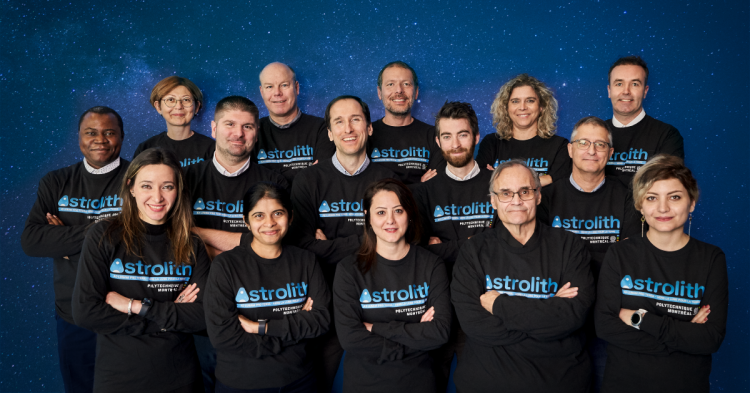Polytechnique Montréal sets up a research unit in space resources and infrastructure engineering, the first such group dedicated to the development of lunar engineering in Canada.
Comprising experts from all seven Polytechnique departments, Astrolith will pursue the mission of helping to develop next-generation technologies and training the engineers of tomorrow to ensure Canada's presence in space and lunar exploration, as well as addressing critical needs on our planet within the context of climate change, resource management and sustainable development.
Astrolith is being created pursuant to the Space Strategy for Canada, which aims to strengthen the country's leadership and innovation in the space sector. The research unit also builds on Canada's Critical Minerals Strategy and Small Modular Reactor (SMR) Action Plan. Research objectives will include supporting the goals of Canada and the Canadian Space Agency in advancing knowledge relative to exploration of the Moon and cislunar space (i.e., between the Earth and the Moon's orbit), propelling Canada as a world leader in the lunar and space industries, envisioning major projects with international partners.

First row: Daria Camilla Boffito; Sampada Bodkhe; Pooneh Maghoul, Richard Boudreault; Elham Baladi. Second row: Foutse Khomh; Jason Robert Tavares; Daniel Therriault; David Mélançon; Michel Gamache. Third row: Gunes Karabulut Kurt; Yves Alain Peter; Giovanni Beltrame; Nathalie de Marcellis-Warin; Louis Laberge Lebel. (Photo: Donald Robitaille)
From the Moon to Earth
Astrolith's activities will target three main objectives. Besides developing next-generation technologies to support exploitation of cislunar and space resources and the related infrastructure, the unit will focus on the economic and environmental aspects of space technology. It will also seek to mobilize knowledge in the space sector, for example by training highly qualified personnel through graduate studies.
As encapsulated in its Latin motto Ad Lunam pro Terra, Astrolith is dedicated to developing technologies with direct impacts here on Earth: enabling development of infrastructure in Canada's North or facilitating the energy transition, for example. Indeed, the research unit's founding members are already involved in developing technologies in various areas related to space and extreme environments, from design of resilient habitats and infrastructure for remote regions to deployment of cislunar communications technologies to development of advanced robotics systems for prospecting and mining, among many others. Their work is bolstered by contributions from specialists in life-cycle analysis, sustainable development and space-related policy development.
Giovanni Beltrame, co-founder of Astrolith and a full professor in the Polytechnique Montréal Department of Computer Engineering and Software Engineering, has been named by the unit's Executive Committee to a two-year term as its head. A former microelectronics engineer with the European Space Agency, he is enthusiastic about this new chapiter in Polytechnique's history.
"Polytechnique has an impressive pool of expert in complementary research fields," Professor Beltrame notes. "By bringing these people together to work on projects in space and lunar engineering, we're creating powerful levers for stimulating research and developing sustainable technologies in Canada. Thanks to them, the sky is no longer the limit: rather, it's where everything begins."
Pooneh Maghoul, co-founder of Astrolith and an associate professor in the Department of Civil, Geological and Mining Engineering, agrees. She points out that this research unit is being created at an especially opportune time: "There is a whole new industry emerging as a result of the NASA Artemis program. Polytechnique Montréal is already leading the way in helping to create it, and establishing itself as a key partner in projects involving lunar and cislunar exploration."










